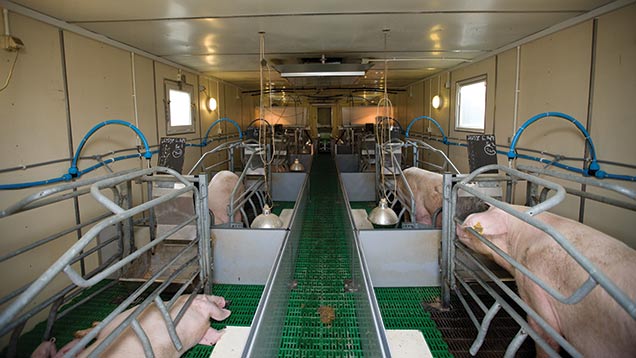Airport toilet technology has designs on pig health
 ©Tim Scrivener
©Tim Scrivener Technology that uses UV light to keep Heathrow Airport’s toilets clean could provide the pig industry with an innovative way to drive down disease.
A type of air filter that removes microcontaminants in the air also destroys harmful bacteria that cause diseases such as salmonella and E coli.
The system, developed by US firm BioZone Scientific, draws air into a purifier that contains a germ-killing, high-powered UV light.
See also: Latest pig farming news
As well as killing germs, the process releases protoplasm – a naturally-occurring species that is capable of destroying odours, bacteria, viruses, mould and mildew on surfaces. The system can also be adapted to be used in water to remove harmful bacteria.
The technology is being used in healthcare, hospitality and washroom sanitation – including the toilets at Heathrow’s Terminal 3, which are used by 35,000 people every day.
But Paul Morris, BioZone’s head of sales, said research had shown the systems could have widespread applications in the livestock industry.
Speaking at the Bpex innovation conference at Stoneleigh Park, Warwickshire, last week, Mr Morris said laboratory tests had shown a surface being treated with a UV filter recorded a 99.9% reduction in E coli- and listeria-causing surface bacteria within one minute.
After 24 hours, there were no E coli, salmonella or listeria surface bacteria present.
Similarly, tests carried out by France’s ministry of research found the UV technology was able to destroy 99.9% of the avian influenza H5N1 virus in less than a minute.
“There is huge potential for this technology to make improvements in the livestock industry,” said Mr Morris.
“On-farm it can be used to improve feed, water, animal health, farmworker health and odour emissions. It also has applications in abattoirs and in post-slaughter pathogen control.”
While implementing the technology on farms was in its infancy, UV light had the potential to offer a cost-effective way of managing pig health and hygiene while reducing antibiotic use and running more profitable units, he added.
